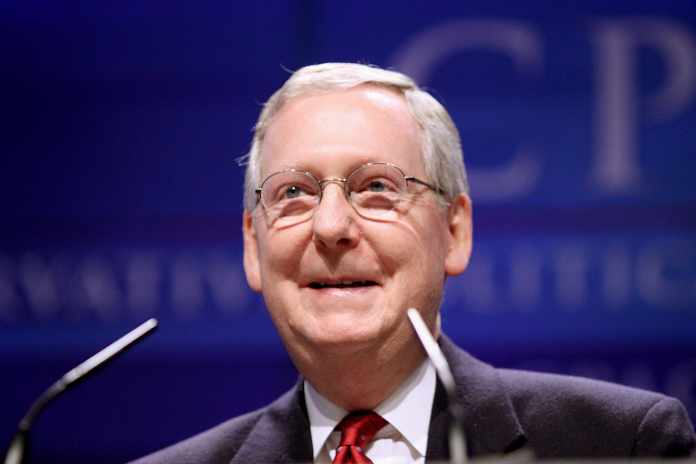According to the latest coronavirus stimulus update, Mitch McConnell announces plans for a new COVID relief bill. The Senate Majority Leader says that President Donald Trump will sign the new law. His announcement comes as a counter-attack on the bipartisan proposal worth $908 billion. The bipartisan proposal was unveiled on December 2, 2020.
Mitch McConnell states that there no time to waste, and the priority should be a decision and not just a proposal now. According to him, the bipartisan proposal is compromise legislation between the Republicans and Democrats. Moreover, he says that there are just a couple of weeks left for the cabinet change. Therefore, a President’s signature must be acquired within that time. Although bipartisan support is mandatory to get a release from Congress, the signature is more important. Therefore, the real question here is whether the authorities are still deciding over a point or wanting to make a new law.
During a public conference, McConnell spoke about his conversation with Steven Mnuchin, Treasury Secretary. The latter revealed that the proposal Mr. Trump chooses to sign states a budget of $500 billion. Moreover, the Senate Republicans all received the notice about the decision. Finally, this bill will become the basis of the upcoming GOP COVID relief project.
Table of Contents
Coronavirus stimulus update of the partisan bill
After the circulation of the proposal, the national media also received a copy of the same. According to news reports about the coronavirus stimulus update, the legislation proposal considers several factors. For example, business liability protection is one of the significant factors. Moreover, the government is allotting $300 billion for the Paycheck Protection Program.
The money will go to employers and business people in need. The proposal also includes $105 billion to reopen schools and prolonged unemployment benefits till January 31, 2021. However, the bill does not include a $1,200 against direct stimulus funds, rental insurance, or local and state funding.
It seems that the COVID relief bill timeline is knocking at the door, and the government funding closes at 11:59 pm on December 11, 2020. Moreover, Congress must approve a new budgetary bill to prevent another lockdown. Mitch McConnell states that the $1.4 Trillion omnibuses are a potential addition to the current COVID relief legislation. The senator also believes that all of the funds may come down to form a single package soon.
On the other hand, D-N. Y. Senator Chuck Schumer criticized Mitch McConnell for the “partisan” approach. Moreover, he requests McConnell to support and work in coordination with the Democrats. Schumer, Nancy Pelosi, House Speaker, and D-Calif sent a new offer to McConnell on December 1. Although the offer details are not evident to the general public, it is undoubtedly an urge to divert the bipartisan court discussion.
What factors does the bipartisan bill include?
According to Schumer, the most significant barrier for everyone who wants to agree is Mr. McConnell refusing the bipartisan approach. Schumer adds that the majority leader is well aware of the fact that the House is majorly Democratic. Therefore, their votes undoubtedly matter the most. However, it is strange that McConnell is hell-bent on continuing his partisan approach negotiation.
On the first half of December 2, the Caucus and Bipartisan groups released their joint proposal for the COVID relief project. It is a part of their effort to bridge the opinion gap and reach a conclusion. According to Senator Mark Warner, the decision won’t please everyone. However, what needs understanding is the amount of work that everyone has done till now.
The bipartisan proposal includes a fund worth $300 billion as an investment for small businesses. It is part of the paycheck Protection Project. There is an allocation of $240 billion as financial help for local and state governments. Moreover, $180 billion goes for unemployment benefits. Last but not least, $300 every week should go to the COVID liability lawsuit fund for the upcoming four months. However, even the bipartisan proposal does not include scope for any stimulus recheck.








